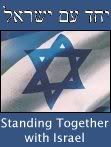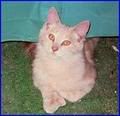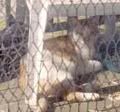Conversion and Identity: The Loaded Jew
I've recently trawled the net checking out Jewish blogs, especially this one, Michaltastik!, written by a passionate, opinionated Jewess and a convert. It got me wondering...
Being a proselyte, I find, can engender a loaded identity. I really want to say, "having been a proselyte". I fail to understand the need to identify oneself as a convert years later (unless, I guess, you are looking to marry, and that's a whole other story). Why does it carry so much meaning, for it seems to me that it only carries so much baggage. I surely can't imagine making a career of it, and yet I have encountered a fair amount of people who seem to do just that.
One might as well identify oneself as a Neojew (with greater emphasis on the 'N' than on the 'j') because we all really need one more formal category to fragment the tribe. In a 'post' or 'trans' denominational Jewish society, heck, what's one more division? Neojews should start their own movement, like the Ba'al Teshuva movement, with the tag, "Once I Was Lost and Now I'm Found". Amazing grace, indeed. Let me be forever stuck with these extraordinary monikers rather than revel in being an ordinary Jew.
One might as well identify oneself as a Neojew (with greater emphasis on the 'N' than on the 'j') because we all really need one more formal category to fragment the tribe. In a 'post' or 'trans' denominational Jewish society, heck, what's one more division? Neojews should start their own movement, like the Ba'al Teshuva movement, with the tag, "Once I Was Lost and Now I'm Found". Amazing grace, indeed. Let me be forever stuck with these extraordinary monikers rather than revel in being an ordinary Jew.
It doesn't help that fuelling the Jewish identity juggernaut, around the fringes you get the almighty Orthodox triumphalists who, like rote ridden hamsters, feel it is their religious duty to set us all straight; like trolls, you can identify them by their insistent derailing of cogent online discussion where, parrot-like, they smite us with arguments about cheeseburgers and driving on Shabbat. Because, of course, these things undermine the very core of Judaism and all Jewish thinking and especially Jewish identity. Oy vey, the drama!
I'm not knocking the facets of identity which we all depend upon to keep us sane and balanced as individuals and by which we are recognised. Without identity, one is truly adrift and forlorn. Those who converted sometimes have stories to tell that born Jews and others can barely fathom. Yet above all else, true religious conversions ('to convert' finds its roots in Latin, convertere, to 'turn around'), stand alone, whether it be Jewish or Christian or Muslim or other.
True conversion is not merely about adopting a different religion; it is an event wherein one encounters G-d and one's hidden self. Abraham was in essence a convert when he encountered G-d, as were Sarah, and Jacob; their names were changed for a reason that had nothing to do with 'adopting' religious practices. Moses, even more strongly than they, was the quintessential convert, whose identity was initially hidden until his encounter with G-d; once uncovered, Moses turned around to who he truly was.
Then Ruth came along. Ruth adopted both a religion, and for the first time in spectacular conversion history, a people, and she did it out of love. Unhappily, it seems that it has been forgotten that she was the enactor, the adopter, not the adopted. Sadly, her conversion can superficially be represented as becoming Jewish for all the wrong reasons, often an argument in contemporary times.
In possibility Ruth's conversion may have heralded a contemporary veiling of that initial truth, of conversion as a 'turning around', as an uncovering of identity after an encounter with G-d. Instead, she becomes a gioret (masc., ger), forever identified as a stranger. So now we argue fruitlessly about "who is a Jew". In my opinion, we are asking the wrong question and it is not a good question either.
Today, yes, you bring with you all the experiences from the past which will always remain a part of you. But they are not always religious experiences just as they may not be for born Jews. When you bring all of yourself to a Jewish present, your past makes not one iota of difference to your Jewish identity which is shaped by one's encounter with G-d and/or an encounter with other aspects of being Jewish. If you question Jewish identity, then you are looking and living on the surface, whether Neojew or born Jew; the question of identity will always haunt you and harangue you and others and undermine Judaism and the Jewish people.
Mordecai Kaplan described Judaism as an evolving religious civilisation. That is not a belief I share but it makes me wonder. When so many of the Orthodox, at least online, and so many big macher rabbis are concerned with the minutiae of practice and developing greater and greater stringencies within halakha, when the social consequences of people's religious practices take centre stage, it makes me wonder if he wasn't a bit prophetic (if you substitute 'devolving' for 'evolving') . Here it seems that Judaism is becoming more and more "man-made" in the sense that enhancing the encounter with G-d is irrelevant. Jews are becoming strangers to their own religion.
And perhaps it takes someone who was once on the outside to point that out, and that people convert or return for all sorts of reasons, but the one I think that is most powerful is an encounter with G-d, echoing the paths of our spiritual kindred. Converting people to a godless model, on the other hand, is simply unJewish (cf this cogent argument for being Orthoprax and how that relates to Jewish identity).
Mordecai Kaplan described Judaism as an evolving religious civilisation. That is not a belief I share but it makes me wonder. When so many of the Orthodox, at least online, and so many big macher rabbis are concerned with the minutiae of practice and developing greater and greater stringencies within halakha, when the social consequences of people's religious practices take centre stage, it makes me wonder if he wasn't a bit prophetic (if you substitute 'devolving' for 'evolving') . Here it seems that Judaism is becoming more and more "man-made" in the sense that enhancing the encounter with G-d is irrelevant. Jews are becoming strangers to their own religion.
And perhaps it takes someone who was once on the outside to point that out, and that people convert or return for all sorts of reasons, but the one I think that is most powerful is an encounter with G-d, echoing the paths of our spiritual kindred. Converting people to a godless model, on the other hand, is simply unJewish (cf this cogent argument for being Orthoprax and how that relates to Jewish identity).
I think that G-d does work in mysterious ways. You may convert to marry a Jew or Jewess and then it snowballs from there or it doesn't. But if it snowballs, there is some encounter with the core identity, the Jew you were meant to be but was denied you at your birth. In some ways, we are like Esau, whose birthright was stolen. And I don't know about anyone else but the coarseness and sensuousness of Esau is as much a part of me as Jacob the delicate geek (as represented by the Sages) studying in tents. Meeting Jacob is the crucial moment, becoming Israel matters more than anything, and after that, wrestling with G-d is the constant refrain.... just like any other Jew for whom Judaism encompasses more than ethnic/religious/social identity.
The core identity does not rely on a religious society and its norms. Community is all important, especially in Judaism, but on some level religious identity transcends religious society and its norms. In my experience community is there to keep you going and keep you growing. It can be a nurturing, inspirational environment, the kind that encourages one to aspire more, do more, study more, be more; and it provides support and hope. On the downside it can be alienating and strangle all expression and wrestling with G-d, just like the rote ridden hamsters.
The experience of conversion, the moment when you are called, and when you decide to answer that call from G-d, who points you in the direction of home, is unspeakable. It is not in the ritual or in attending to religious norms. It is so powerful that it sweeps you along with perfect faith and certainty that this is what G-d intended and that G-d will help you see it through; it made me fearless in that pursuit. To see the raised Torah scroll was the validation, because I finally met myself.
When you go through the ritual of conversion you dissolve into the tribe, and you are absorbed. It happens because of G-d, not because of the tribe, and because of G-d some of the tribe accepts and receives you. You bring your unique self to the community just like any other Jew, not your identity as a convert, unless you are invested in being a Neojew.
Yes, in day-to-day sharing and relating, it can be awkward when born Jews speak of their past, their family experiences, things you were deprived of in terms of Jewish experience. But, in my opinion that is a relatively small thing, unless that is all that matters or is a relatively big thing in a community. What you carry with you is a remarkable story and experience intimately shared with our spiritual ancestors. What you carry with you is the fact that your soul was Jewish from day one and that you are no different than any other Jewish soul. There is no need for a Neojewish identity, for you have simply uncovered what was always there. The rest is merely commentary.
Labels: conversion, convert, Jewish identity, Orthodox, who is a jew





 Mama
Mama
 Josh
Josh

 Han
Han
 Emet
Emet
 Sammie
Sammie
 Marly
Marly
 Tan Guy
Tan Guy
 Socks
Socks
 Big Daddy
Big Daddy
 Chaplin
Chaplin
 Coffee
Coffee
 Dove
Dove

 Bosco
Bosco
 Zena
Zena

